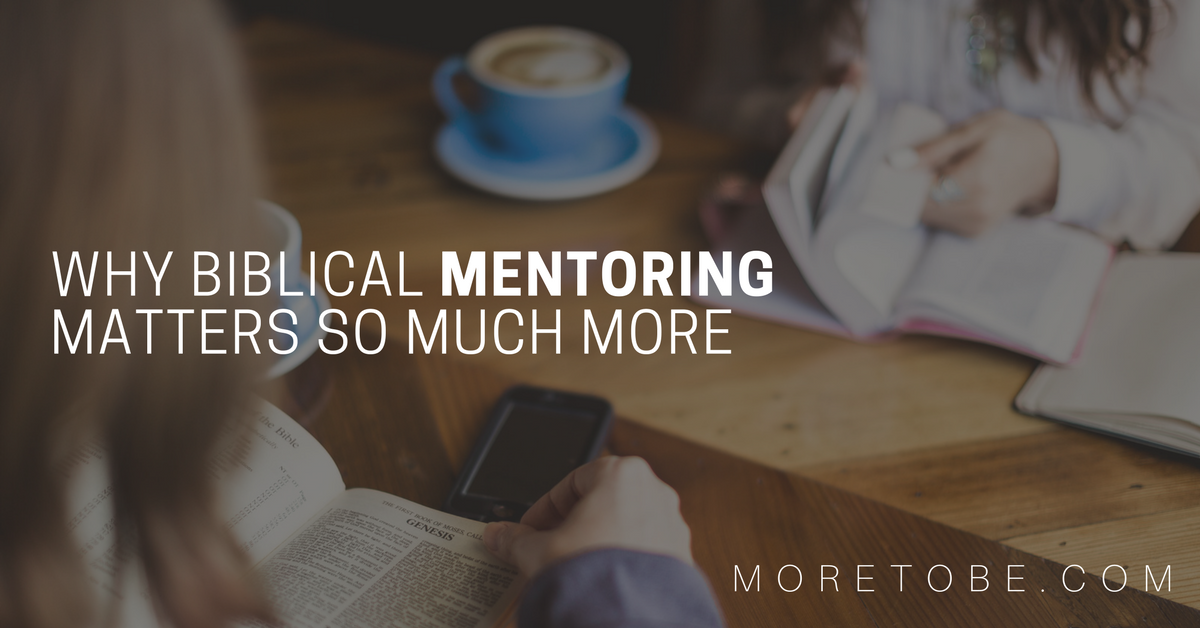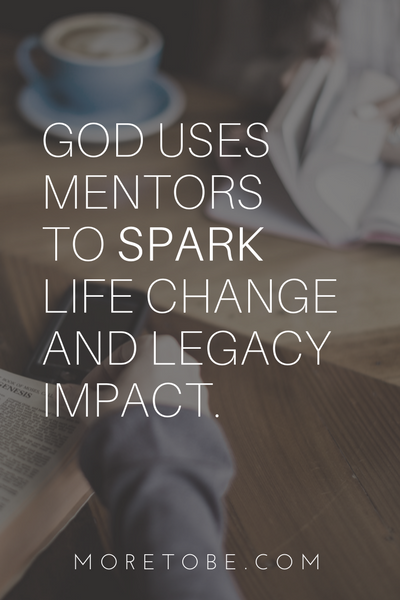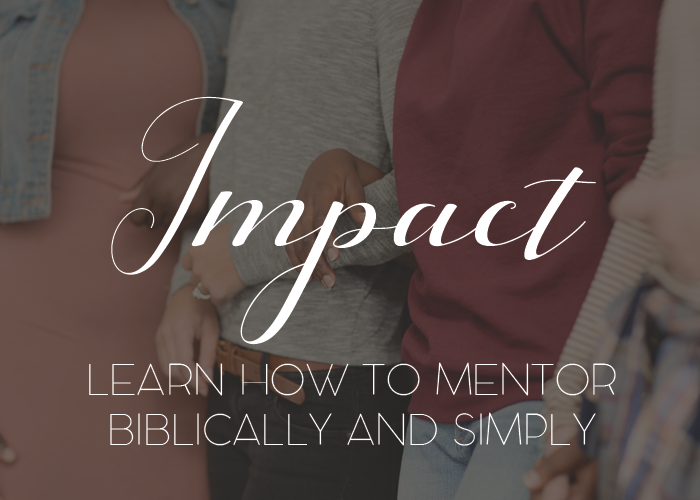I’m curious, what do you think of when you hear the word mentoring?
Actually, before you read any further, would you mind leaving a comment or drop me a note to let me know. I’d love to hear your perspective!
Maybe you’ve figured this out already, but mentoring is something I’m super passionate about. Yet I remember a time when the word made my stomach turn. I know I’m not the only one that shares that feeling. But I wonder if it could be for all the wrong reasons. What do you think causes the squirm factor?

Is it because there is a deep longing in our hearts for an older woman to intentionally and sacrificially invest in our lives, but to admit that somehow diminishes our own self-sufficiency or even God-dependency?
Is the problem that confessing the desire for a mentor requires humility, accountability, and teachability in an otherwise autonomous culture, and that just feels strange?
Maybe you are the “older woman” and feel like you should have your life all perfectly package in order to mentor. Maybe you’re afraid of the time commitment or the unrealistic expectations. I get it, especially after the years I’ve served as a mentor.
Take heart, friend, we don’t have to have it all together to be perfectly used by God as a mentor.
Mentoring can be messy, imperfect, and totally uncomplicated. And that’s good news because biblical mentoring matters so much more than ever before.
Make Mentoring Simple

Grab this super simple resource containing 100 life coaching questions that will equip you to reach the hearts of those you feel called to mentor.
Why Mentoring Matters So Much More
Biblical mentoring relationships steeped in God’s love make a place for the Truth to be taught and caught.
The problem is that what we don’t see from the few verses found in Titus 2:3-5 that are often the foundation for establishing a mentoring relationship. To really understand the beauty and purpose of Titus 2, we have to have to read on to the end of the chapter:
Titus 2:11-15 NLT
For the grace of God has been revealed, bringing salvation to all people. And we are instructed to turn from godless living and sinful pleasures. We should live in this evil world with wisdom, righteousness, and devotion to God, while we look forward with hope to that wonderful day when the glory of our great God and Savior, Jesus Christ, will be revealed. He gave his life to free us from every kind of sin, to cleanse us, and to make us his very own people, totally committed to doing good deeds. You must teach these things and encourage the believers to do them. You have the authority to correct them when necessary, so don’t let anyone disregard what you say.

Paul reminds us, gently but purposefully, to live in the grace of God as we turn from godless living and sinful pleasures. It’s a “taking off” instruction followed by a “putting on” of wisdom, righteousness, and devotion to God. Pretty simple concept, right? But here’s the deal — it’s not just our own living we’re responsible for.
He urges us to teach these biblical truths and live them out together. That’s what biblical mentoring is all about, and there’s never been a time when that need has been greater.
The next generation is yearning for mentors.
They are lost, lonely, depressed, anxious, overwhelmed, and more isolated than ever before, thanks in part to screens and social media. I would hedge a bet that “the generation” is actually multiple generations . . . from the GenXers right down to the youngest Millennials.
The Millennials, along with the rest of us, need to see those who have gone before us living for Jesus in the messy, everyday reality of life.
What we really need is parakaleō, which is the Greek of the word for “encourage,” which is also translated as “exhort” in the ESV. It means “to call to one’s side, call for, summon; to address, speak to, (call to, call upon), which may be done in the way of exhortation, entreaty, comfort, instruction, etc.; to admonish, exhort; to beg, entreat, beseech; to strive to appease by entreaty; to console, to encourage and strengthen by consolation, to comfort; to receive consolation, be comforted; to encourage, strengthen; exhorting and comforting and encouraging; to instruct, teach.”
When parakaleō is at the heart of biblical mentoring, hearts are captured by God for His glory.
While parakaleō is foundational to a healthy mentoring relationship, it’s the balm that enables the second part of Paul’s instruction to be carried out — the correction, or as it’s translated in the NIV and ESV, the “rebuke,” which comes from the Greek word, “elegchō.” This word means “to convict, refute, confute; generally with a suggestion of shame of the person convicted; by conviction to bring to the light, to expose; to find fault with, correct by word; to reprehend severely, chide, admonish, reprove; to call to account, show one his fault, demand an explanation; by deed; to chasten, to punish.” Does it make you cringe and want to run from mentoring relationships? Well, it should make you feel that way if there is no parakaleō!
It’s the ongoing, coming along side part of a relationship that makes room for the teaching, training, correcting, and rebuking!

It’s in a parakaleō kind of relationship where the Holy Spirit is given the freedom to work, leading to conviction and shame that brings about but the “taking off” of sin and “putting on” godly living. Don’t we all need that accountability? I know that shame often feels wrong to us, but that’s because the use of it is too often abused. But the shame that comes from humble and godly correction, like what Paul describes in 2 Thessalonians 3, can call a sister-in-Christ home to the heart of God when she might otherwise be tempted to run.
2 Thessalonians 3:13-15
As for the rest of you, dear brothers and sisters, never get tired of doing good. Take note of those who refuse to obey what we say in this letter. Stay away from them so they will be ashamed. Don’t think of them as enemies, but warn them as you would a brother or sister.
This shame, or “entrepō,” is really an invitation to turn toward God, as it invites the one feeling ashamed “to turn about.” Maybe you’ve experienced it for yourself, as you responded to a calling out from a friend who loved you deeply. It was because of their love that you could hear the voice of God and the Holy Spirit’s leading. That’s why, friend, mentoring relationships are so powerful and so necessary.
[clickToTweet tweet=”God uses mentors to spark life change and legacy impact. So will you say yes to being a mentor?” quote=”God uses mentors to spark life change and legacy impact. So will you say yes to being a mentor?”]
Mentors don’t do the life-changing — they are simply the vessel God uses to set the stage for His Work.
Really, a mentor’s only responsibility is to say “yes” to the intentional pursuit of parakaleō (encouraging), made possible by a coming alongside investment of time, which creates a relationship in which elegchō (correcting) can happen so that the Lord may accomplish the entrepō (calling an about face). Now isn’t that just amazing! And isn’t that what we all really crave — relationships rooted in love and investment, where we are seen and known and discover that our lives matter deeply someone who isn’t required to even care.
Isn’t that what it looks like to be the hands and feet of Christ — to convey that kind of message of love?
And isn’t this generation one that needs that message more than ever before?
So, let me ask now: What do you think about the word “mentor”?
Maybe, more importantly, are you willing to answer the call to mentor biblically for the glory of God?
If you’re ready to say yes, let us help you take the next step with the Impact Mentoring Course.



